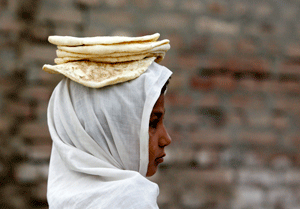Catholic development organizations praised leaders of the Group of Eight nations on July 8 for pledging $20 billion over the next three years to combat global hunger through greater support of agriculture in some of the world's poorest nations. But the groups said there was still more to be done and called the next steps "crucial."
The International Cooperation for Development and Solidarity, an international alliance of Catholic development agencies known as CIDSE, which includes Catholic Relief Services, the U.S. bishops' overseas relief and development agency, applauded the leaders for their monetary commitment to the agricultural issues in developing nations. However, CIDSE also said it was worried that the initiative, led by U.S. President Barack Obama, will not be enough. "The G-8's focus on small-holder farmers and women in particular is positive, but the financial commitments are not," said Bob van Dillen, policy officer at Cordaid, a CIDSE member in the Netherlands. "The G-8 sets aside $20 billion for the coming three years, while they have spent $13 billion in just the past 18 months. This simply means $20 billion won't be enough to feed the world's 1 billion hungry," he said in a statement.
Bill O'Keefe, CRS' senior director for advocacy, said he believes the battle against global hunger can be won with the support of governments. He said now more people are struggling without an adequate amount of food because of the international financial crisis, which makes the G-8 commitment even more opportune. "While this effort is overdue, it is also timely. The food-price crisis and our concern about the impact of global climate change on rain-fed agriculture in Africa make the effort all the more urgent," O'Keefe said. "The key to success for this effort is whether it targets the poorest farmers in the poorest countries."
Almost 18 percent of the G-8's pledged funds are to come directly from the United States while both Japan and the European Union each were expected to pledge about 15 percent of the total. No other details were given on each country's contribution. The G-8 said it would remain committed to emergency aid and entertained calls for the end of food-export restrictions.
Despite his approval of the G-8's commitment to agricultural development, O'Keefe said the next steps are crucial and must be completed in a timely manner. "Obviously, delivering on this commitment is more important than making it: The U.S. and the other G-8 countries need to get the funds in the pipeline," he said, adding that the funds must complement and "not displace existing" U.S. investments in food aid.








